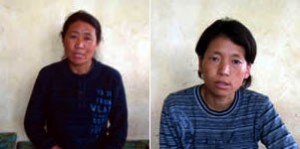
Lhundup Zangmo and Rigzin Choekyi
Both Rigzin Choekyi and Lhundrub Zangmo now wish to receive medical treatment due to concerns for their health following torture in prison, and to study in exile.
Rigzin Choekyi, a Shugsib nun in her thirties, was detained at the age of 24 in August 1990 for taking part in a peaceful protest in the Barkor area of Lhasa together with five other Shugsib nuns. Her original sentence was seven years, extended by five years in 1993 after the nuns recorded the songs in their cells. Lhundrub Zangmo, from Mechungri nunnery, was 23 when she was arrested also in August 1990 for taking part in a peaceful protest at the Norbulingka in Lhasa during the Shoton (Yogurt) Festival, together with a group of 12 other nuns from Mechungri and also from Garu nunneries. Lhundrub Zangmo’s four year sentence was extended by another five years after the tape-recording of the songs.
The nuns who have arrived in exile say that they recorded the songs in 1993 as a way of demonstrating to their family and friends outside the prison that their spirits had not been broken. When handing down the extended prison sentences, the Chinese authorities stated that the 14 nuns had “recorded reactionary ‘Tibetan independence’ songs in an attitude of counter-revolutionary arrogance” and said that “their attitude to confession was abominable” (Lhasa City Intermediate People’s Court, Tibet Autonomous Region Criminal Sentencing Document, 1993, published in English by ICT here).
The release of 34-year old Tibetan nun Phuntsog Nyidron into exile in the United States on March 15 marked the end of the imprisonment in Tibet for a courageous and determined group of women who became known as the ‘singing nuns’. It is rare for political prisoners to be sent directly into exile in the West, and it generally follows months or years of behind the scenes diplomacy at high levels. Most former political prisoners, like Rigzin Choekyi and Lhundrub Zangmo, make the dangerous journey across the Himalayas into Nepal, usually then transiting to India.
Monks and nuns in Tibet who serve prison sentences are not allowed to rejoin their monasteries and nunneries on release, and so are often dependent on their families. All of them endure restrictions on their movement and almost continuous surveillance after their release, which is the reason why many of them see no alternative but to travel into exile.
Further Information
- Phuntsog Nyidron finally receives Reebok Award for Human Rights in moving ceremony – May 19th, 2006, ICT report
- ‘Song of Sadness’ from Drapchi prison: the official Chinese verdict on the Drapchi ‘singing nuns’ – March 30th, 2006, ICT report
- 2004 Refugee Report: Dangerous Crossing – 2004 Update, ICT report

